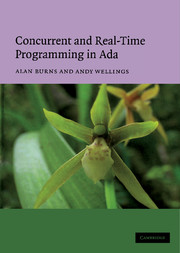Book contents
- Frontmatter
- Contents
- Preface
- 1 Introduction
- 2 The nature and uses of concurrent programming
- 3 Inter-process communication
- 4 Task types and objects
- 5 The rendezvous
- 6 The select statement and the rendezvous
- 7 Protected objects and data-oriented communication
- 8 Avoidance synchronisation and the requeue facility
- 9 Exceptions, abort and asynchronous transfer of control
- 10 Object-oriented programming and tasking
- 11 Concurrency utilities
- 12 Tasking and systems programming
- 13 Scheduling real-time systems – fixed priority dispatching
- 14 Scheduling real-time systems – other dispatching facilities
- 15 Timing events and execution-time control
- 16 Real-time utilities
- 17 Restrictions, metrics and the Ravenscar profile
- 18 Conclusion
- References
- Index
17 - Restrictions, metrics and the Ravenscar profile
Published online by Cambridge University Press: 10 December 2009
- Frontmatter
- Contents
- Preface
- 1 Introduction
- 2 The nature and uses of concurrent programming
- 3 Inter-process communication
- 4 Task types and objects
- 5 The rendezvous
- 6 The select statement and the rendezvous
- 7 Protected objects and data-oriented communication
- 8 Avoidance synchronisation and the requeue facility
- 9 Exceptions, abort and asynchronous transfer of control
- 10 Object-oriented programming and tasking
- 11 Concurrency utilities
- 12 Tasking and systems programming
- 13 Scheduling real-time systems – fixed priority dispatching
- 14 Scheduling real-time systems – other dispatching facilities
- 15 Timing events and execution-time control
- 16 Real-time utilities
- 17 Restrictions, metrics and the Ravenscar profile
- 18 Conclusion
- References
- Index
Summary
The last few chapters have demonstrated the extensive set of facilities that Ada 2005 provides for the support of real-time programming. The expressive power of the full language is clearly more comprehensive than any other mainstream engineering language. There are, however, situations in which a restricted set of features are desirable. This chapter looks at ways in which certain restrictions can be identified in an Ada program. It then describes in detail the Ravenscar profile, which is a collection of restrictions aimed at applications that require very efficient implementations, or have high-integrity requirements, or both. This chapter also includes a discussion of the metrics identified in the Real-Time Systems Annex.
Restricted tasking and other language features
Where it is necessary to produce very efficient programs, it is useful to have runtime systems (kernels) that are tailored to the particular needs of the program actually executing. As this would be impossible to do in general, the Ada language defines a set of restrictions that a run-time system should recognise and ‘reward’ by giving more effective support. The following restrictions are identified by the pragma called Restrictions, and are checked and enforced before run-time. Note however, that there is no requirement on the run-time to tailor itself to the restrictions specified.
Information
- Type
- Chapter
- Information
- Concurrent and Real-Time Programming in Ada , pp. 433 - 450Publisher: Cambridge University PressPrint publication year: 2007
